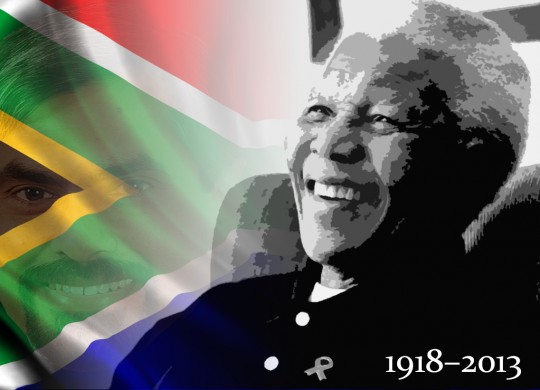Forgiveness!

Nelson Rolihlahla Mandela (1918–2013), the architect of the dismantling of apartheid in South Africa, and its first President afterwards, recipient of over 250 international honors—including Russia’s Order of Lenin, India’s Bharat Ratna, the US Presidential Medal of Freedom, and the Nobel Peace Prize—passed away on December 5.
Mr. Mandela was imprisoned for twenty-seven years, eighteen of them in Robben Island, in a small cell, sleeping on a straw mat on the floor, with a bucket for a toilet, doing hard labor in a stone quarry, verbally and physically abused by white prison guards. Of the food there, Mandela wrote:
The authorities liked to say that we received a balanced diet; it was indeed balanced—between the unpalatable and the inedible.”
Once a year he would get a visitor for half an hour, and one letter every six months. His mother died in 1968, and his firstborn son the following year, in a car accident. Mr. Mandela was forbidden from attending either funeral. His wife was rarely able to come, frequently in jail herself; and his daughters first visited him in December 1975.
A few years into his captivity, guards ordered him to dig and climb into a grave-shaped ditch. Was this the end?
As he lay there in the dirt, the guards urinated on the man.
Many years later, an aide sought from Mr. Mandela a list of those he wished to invite to his Presidential inauguration dinner. All the big names in the freedom struggle would be there, of course. But apparently the sole name he is said to have insisted upon was that of a former jailer!
“Lord, how often shall my brother sin against me
and I forgive him? Up to seven times?”
Jesus said to him, “I do not say to you, up to seven times,
but up to seventy times seven.”
Matthew 18:21–22
One reporter wrote:
Mr. Mandela lived an extraordinary life that showed him to be a skilled tactician, a ruthless adversary, an able politician, an incisive and catholic thinker about liberation and oppression. But he will be remembered for one quality above all others: his capacity to forgive, and to turn that forgiveness into a visible reconciliation.”
Finally Nelson Mandela was released on February 2, 1990. Holding his wife’s hand, he gave a speech in Cape Town’s City Hall, declaring his commitment to peace and reconciliation with the white minority.
Be kind to one another, tender-hearted,
forgiving each other,
just as God in Christ also has forgiven you.
Ephesians 4:32
When elections were held in 1994, Mandela was appointed as South Africa’s first black chief executive in Pretoria, an inauguration viewed by a billion viewers worldwide.
(My prayer journal from those days records my praying for that nation shackled in apartheid. So I, too, had a role to play, albeit infinitesimal!)
Mr. Mandela even visited Betsie Verwoerd, widow of the designer of apartheid Hendrik Verwoerd, in her whites-only community, for tea. He joyfully donned the South African rugby jersey and embraced the all-white team when they won the world title. He retained former President de Klerk’s personal assistant as his own, always speaking to her in the Afrikaans he had learned in jail. Gestures deep in symbolism, rich in generosity, heartfelt in forgiveness.
But if your enemy is hungry, feed him,
and if he is thirsty, give him a drink.
Romans 12:20
Robben Island is now a national and World Heritage Site. Because of Nelson Rolihlahla Mandela, the man who forgave.
“For if you forgive others for their transgressions,
your heavenly Father will also forgive you.”
Matthew 6:14











 Abe Kuruvilla is the Carl E. Bates Professor of Christian Preaching at The Southern Baptist Theological Seminary (Louisville, KY), and a dermatologist in private practice. His passion is to explore, explain, and exemplify preaching.
Abe Kuruvilla is the Carl E. Bates Professor of Christian Preaching at The Southern Baptist Theological Seminary (Louisville, KY), and a dermatologist in private practice. His passion is to explore, explain, and exemplify preaching.